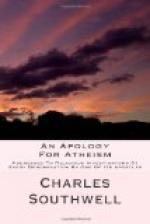The dogma that something has existed from all eternity, as already shown, is perfectly intelligible, and may defy contradiction—but the real difficulty is to satisfactorily determine what that something is. Matter exists; and as no one can even imagine its non-existence or annihilation, the materialist infers that must be the eternal something. Newton as well as Clarke thought the everlasting Being destitute of body, and consequently without parts, figure, motion, divisibility, or any other such properties as we find in matter—ergo, they did not believe matter to be the eternal something; but if not matter, again we ask, what can it be? Of bodilessness or incorporiety no one, even among those who say their God is incorporeal, pretend to have an idea. Abady insisted that the question is not what incorporiety is, but whether it be? Well, we have no objection to parties taking that position, because there is nothing more easy than to dislodge those who think fit to do so—for this reason: the advocates of nothing, or incorporiety, can no more establish by arguments drawn from unquestioned facts, that incorporiety is than they can clearly show what it is. It has always struck the Author as remarkable that men should so obstinately refuse to admit the possibility of matter’s necessary existence, while they readily embrace, not only as possibly, but certainly, true, the paradoxical proposition that a something, having nothing in common with anything, is necessarily existent. Matter is everywhere around and about us. We ourselves are matter—all our ideas are derived from matter—and yet such is the singularly perverse character of human intellect that, while resolutely denying the possibility of matter’s eternity, an immense number of our race embrace the incredible proposition that matter was created in time by a necessarily existing Being who is without body, parts, passions, or positive nature!
The second dogma informs us that this always-existing Being is unchangeable and independent. One unavoidable inference from which is that Deity is itself immoveable, as well as unconnected with the universe—for a moveable Being must be a changeable Being by the very fact of its motion; while an independent Being must be motiveless, as it is evident all motives result from our relationship to things external; but an independent Being can have no relations, and consequently must act without motives. Now, as no human action can be imagined without necessary precursors in the shape of motives, reasoning from analogy, it seems impossible that the unchangeable and independent Being, Clarke was so sure must ever have existed, could have created the universe, seeing he could have had no motive or inducement to create it.
The third dogma may be rated a truism—it being evidently true that a thing or Being, which has existed from eternity without any external cause of its existence, must be self-existent; but of course that dogma leaves the disputed question, namely, whether matter, or something not matter, is self-existent, just where it found it.




